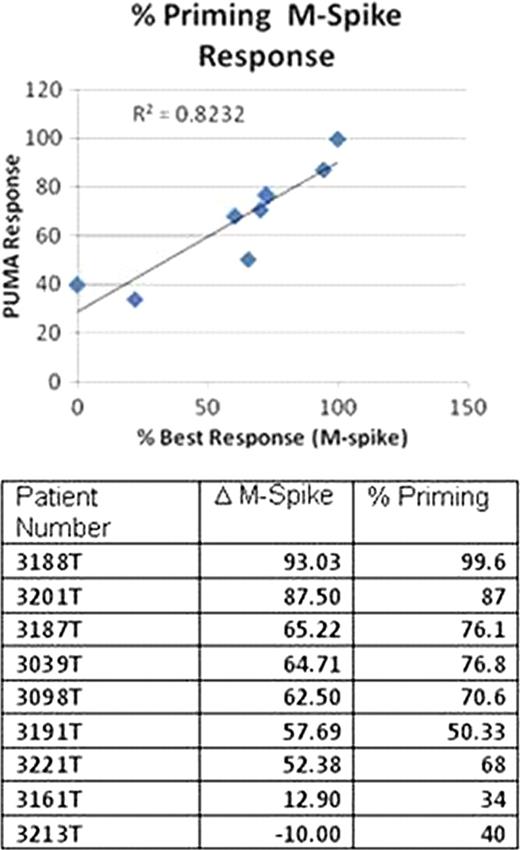Abstract
Abstract 3952
The clinical course of multiple myeloma (MM) is highly variable and difficult to predict. Despite ongoing improvements in the treatment, relapse remains inevitable even with novel therapies. Thereis aneed to better tailor patient-specific treatment strategies to increase efficacy without increasing side effects.There are currently no prognostic tools to predict MM patient response to a particular chemotherapy regimen, and consequently this remains a critical unmet need.
Eutropics isdeveloping a novel diagnostic assay called BH3 profiling for commercial use. Initial studies at Eutropics and at the Dana Farber Cancer Institute indicate that the BH3 profiling assay is predictive for MM patient response to treatment. The assay probes mitochondria of cancer cells and indicates when or if they are able to respond to upstream apoptosis signaling induced by these treatments. The underlying principle of the assay is that as a result of aberrant phenotypes, cancer cells develop blocks in apoptosis signaling pathways. These blocks make cancer cells both resistant to some therapies, but surprisingly, make some cancer cells hyper-sensitive to other therapies. BH3 profiling determines if a dependence on certain apoptosis regulating proteins for survival occurs in given cancer cells, and identifies the dependent protein. This understanding provides a unique insight to the best course of treatment, and in particular to treatment with apoptosis inducing bortezomib combination treatments.
We use the test on CD138+ plasma cells purified from MM patients prior to or during the course of treatment with bortezomib based regimens. We perform the test on either fresh or viably frozen samples obtained from patients in a prospective manner. Here we report the results of test set data from both fresh and fresh frozen archived samples.
BH3 profiling measures the functional state of the pro-survival Bcl-2 and pro-apoptotic family proteins for regulating or inducing apoptosis by determining the immediate response to BH3 proteins (e.g. PUMA, NOXA, BAD). By doing this, the assay identifies the mechanical defect that leads to apoptosis resistance in a given cancer cell. It does this by selectively antagonizing each of the anti-apoptotic proteins, and directly measuring the mitochondrial response. The signature response indicates if cells will respond to apoptosis-inducing signals. Cancer cells that are predicted to respond to pro-apoptotic signals are considered “primed”. The BH3 profile also identifies which of the pro-survival Bcl-2 family members are involved in the cell death pathway.
Thomenius:Eutropics Pharmaceuticals: Employment, Salary. Lena:AEutropics Pharmaceuticals: Employment, salary. Chonghaile:Eutropics Pharmaceuticals: Consultancy, fee. Lyle:Eutropics Pharmceuticals: Consultancy, Employment. Letai:Eutropics Pharmaceuticals: Consultancy, Membership on an entity's Board of Directors or advisory committees. Cardone:Eutropics Pharmaceuticals: Employment, Equity Ownership, salary.
Author notes
Asterisk with author names denotes non-ASH members.


This feature is available to Subscribers Only
Sign In or Create an Account Close Modal